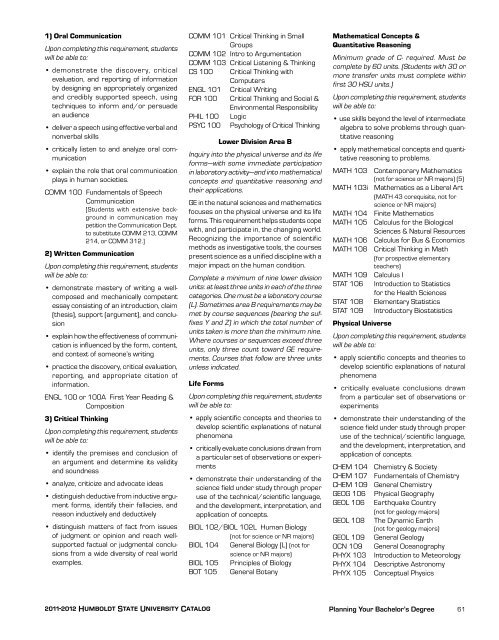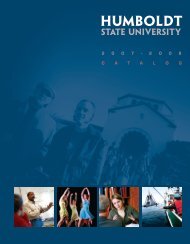2011-12 Academic Year - Bad Request - Humboldt State University
2011-12 Academic Year - Bad Request - Humboldt State University
2011-12 Academic Year - Bad Request - Humboldt State University
Create successful ePaper yourself
Turn your PDF publications into a flip-book with our unique Google optimized e-Paper software.
1) Oral Communication<br />
Upon completing this requirement, students<br />
will be able to:<br />
• demonstrate the discovery, critical<br />
evaluation, and reporting of information<br />
by designing an appropriately organized<br />
and credibly supported speech, using<br />
techniques to inform and/or persuade<br />
an audience<br />
• deliver a speech using effective verbal and<br />
nonverbal skills<br />
• critically listen to and analyze oral communication<br />
• explain the role that oral communication<br />
plays in human societies.<br />
COMM 100 Fundamentals of Speech<br />
Communication<br />
[Students with extensive background<br />
in communication may<br />
petition the Communication Dept.<br />
to substitute COMM 213, COMM<br />
214, or COMM 3<strong>12</strong>.]<br />
2) Written Communication<br />
Upon completing this requirement, students<br />
will be able to:<br />
• demonstrate mastery of writing a wellcomposed<br />
and mechanically competent<br />
essay consisting of an introduction, claim<br />
(thesis), support (argument), and conclusion<br />
• explain how the effectiveness of communication<br />
is influenced by the form, content,<br />
and context of someone’s writing<br />
• practice the discovery, critical evaluation,<br />
reporting, and appropriate citation of<br />
information.<br />
ENGL 100 or 100A First <strong>Year</strong> Reading &<br />
Composition<br />
3) Critical Thinking<br />
Upon completing this requirement, students<br />
will be able to:<br />
• identify the premises and conclusion of<br />
an argument and determine its validity<br />
and soundness<br />
• analyze, criticize and advocate ideas<br />
• distinguish deductive from inductive argument<br />
forms, identify their fallacies, and<br />
reason inductively and deductively<br />
• distinguish matters of fact from issues<br />
of judgment or opinion and reach wellsupported<br />
factual or judgmental conclusions<br />
from a wide diversity of real world<br />
examples.<br />
<strong>2011</strong>-20<strong>12</strong> <strong>Humboldt</strong> <strong>State</strong> <strong>University</strong> Catalog<br />
COMM 101 Critical Thinking in Small<br />
Groups<br />
COMM 102 Intro to Argumentation<br />
COMM 103 Critical Listening & Thinking<br />
CS 100 Critical Thinking with<br />
Computers<br />
ENGL 101 Critical Writing<br />
FOR 100 Critical Thinking and Social &<br />
Environmental Responsibility<br />
PHIL 100 Logic<br />
PSYC 100 Psychology of Critical Thinking<br />
Lower Division Area B<br />
Inquiry into the physical universe and its life<br />
forms—with some immediate participation<br />
in laboratory activity—and into math ematical<br />
concepts and quan titative reasoning and<br />
their applications.<br />
GE in the natural sciences and mathematics<br />
focuses on the physical uni verse and its life<br />
forms. This requirement helps students cope<br />
with, and participate in, the chang ing world.<br />
Recognizing the importance of scientific<br />
methods as investigative tools, the cours es<br />
present science as a unified discipline with a<br />
major impact on the human condition.<br />
Complete a minimum of nine lower division<br />
units: at least three units in each of the three<br />
categories. One must be a laboratory course<br />
(L). Sometimes area B requirements may be<br />
met by course sequences (bearing the suffixes<br />
Y and Z) in which the total number of<br />
units taken is more than the minimum nine.<br />
Where courses or se quences ex ceed three<br />
units, only three count toward GE requirements.<br />
Courses that follow are three units<br />
unless indicated.<br />
Life Forms<br />
Upon completing this requirement, students<br />
will be able to:<br />
• apply scientific concepts and theories to<br />
develop scientific explanations of natural<br />
phenomena<br />
• critically evaluate conclusions drawn from<br />
a particular set of observations or experiments<br />
• demonstrate their understanding of the<br />
science field under study through proper<br />
use of the technical/scientific language,<br />
and the development, interpretation, and<br />
application of concepts.<br />
BIOL 102/BIOL 102L Human Biology<br />
(not for science or NR majors)<br />
BIOL 104 General Biology (L) (not for<br />
science or NR majors)<br />
BIOL 105 Principles of Biology<br />
BOT 105 General Botany<br />
Mathematical Concepts &<br />
Quantitative Reasoning<br />
Minimum grade of C- required. Must be<br />
complete by 60 units. (Students with 30 or<br />
more transfer units must complete within<br />
first 30 HSU units.)<br />
Upon completing this requirement, students<br />
will be able to:<br />
• use skills beyond the level of intermediate<br />
algebra to solve problems through quantitative<br />
reasoning<br />
• apply mathematical concepts and quantitative<br />
reasoning to problems.<br />
MATH 103 Contemporary Mathe mat ics<br />
(not for science or NR majors) (5)<br />
MATH 103i Mathematics as a Liberal Art<br />
(MATH 43 corequisite, not for<br />
science or NR majors)<br />
MATH 104 Finite Mathematics<br />
MATH 105 Calculus for the Biological<br />
Sciences & Natural Resources<br />
MATH 106 Calculus for Bus & Economics<br />
MATH 108 Critical Thinking in Math<br />
(for prospective elementary<br />
teachers)<br />
MATH 109 Calculus I<br />
STAT 106 Introduction to Statistics<br />
for the Health Sciences<br />
STAT 108 Elementary Statistics<br />
STAT 109 Introductory Biostatistics<br />
Physical Universe<br />
Upon completing this requirement, students<br />
will be able to:<br />
• apply scientific concepts and theories to<br />
develop scientific explanations of natural<br />
phenomena<br />
• critically evaluate conclusions drawn<br />
from a particular set of observations or<br />
experiments<br />
• demonstrate their understanding of the<br />
science field under study through proper<br />
use of the technical/scientific language,<br />
and the development, interpretation, and<br />
application of concepts.<br />
CHEM 104 Chemistry & Society<br />
CHEM 107 Fundamentals of Chemistry<br />
CHEM 109 General Chemistry<br />
GEOG 106 Physical Geography<br />
GEOL 106 Earthquake Country<br />
(not for geology majors)<br />
GEOL 108 The Dynamic Earth<br />
(not for geology majors)<br />
GEOL 109 General Geology<br />
OCN 109 General Oceanography<br />
PHYX 103 Introduction to Meteorology<br />
PHYX 104 Descriptive Astron omy<br />
PHYX 105 Conceptual Physics<br />
Planning Your Bachelor’s Degree<br />
61

















